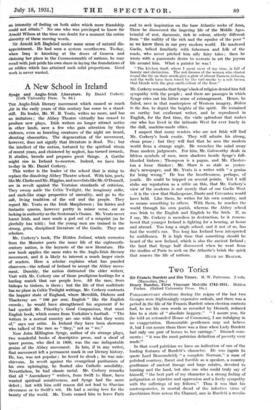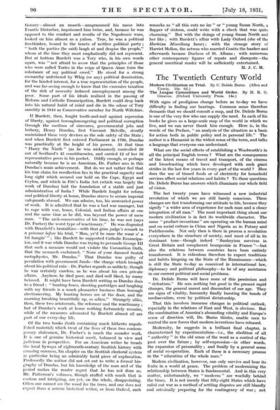Two Tories
Henry Dundas, First Viscount Melville 1742-1811. Holdon Farber. (Oxford University Press. 168.) PARLIAMENTARY elections during the reigns of the last two Georges were frighteningly expensive ordeals, and there was a period in the life of Sir Francis Burdett when election contests had, to use his own words as recorded by Disraeli, reduced him to a state of " absolute beggary." " I assure you, Sir (he told an astounded House of Commons), I am indulging in no exaggeration. Honourable gentlemen may not believe it, but I can assure them there was a time when Lady Burdett had only one pair of horses to her carriage." Disraeli com- ments : " it was the most patrician definition of poverty ever made."
In that word patrician we have an indication of one of the leading features of Burdett's character. He was (again to quote Lord Beaconsfield) " a complete Norman," a man of polished courtesy, fluent and forcible as a speaker, a country gentleman of ancient lineage and large estates, devoted to hunting and the land, but also one who could truly say of himself, " the best part of my character is a strong feeling of indignation at injustice and oppression and a lively sympathy with the sufferings of my fellows." Thus it was that his contemporaries, in mortal dread of the infective virus of Jacobinism from across the Channel, saw in Burdett a revolu- tionary,-almost an anarch—anagrarnmed his name into Frantic Disturber, imprisoned him twice, and, because he was opposed to the conduct and results of the Napoleonic wars, looked on him almost as a yahoo. True, he was a political freethinker, bound to the tenets of neither political party ; " both the parties (he said) laugh at and despise the people," whom at the time they most emphatically did not represent. But at bottom Burdett was a Tory who, in his own words again, was " not afraid to avow that the principles of those who were called Tories in the reign of Queen Anne form the substance of my political creed." He stood for a strong monarchy unfettered by Whig (or any) political domination, for the landed interest, for a true representation of the people, and was far-seeing enough to know that the excessive taxation of the rich of necessity induced unemployment among the poor. Some part of his ideals realized in the passing of Reform and Catholic Emancipation, Burdett could drop back into his natural habit of mind and die in the odour of Tory sanctity in 1844 as Conservative member for North Wiltshire.
If Burdett, then, fought tooth-and-nail against repression of liberty, against borouglunongering and political corruption through the medium of sinecures, governmental jobs and bribery, Henry Dundas, first Viscount Melville, stoutly maintained these very devices as the sole safety of the State ; and when Burdett first entered Parliament in 1796, Dundas was practically at the height of his power. At that time " Harry the Ninth " (as he was nicknamed) controlled 39 out of Scotland's 45 constituencies, and carried 12 of her 16 representative peers in his pocket. Oddly enough, or perhaps naturally because he is an American, Dr. Furber sees in this Dundas's main achievement. But do we not rather feel that his true claim for recollection lies in the practical sagacity and long sight which secured our hold on the Cape, Egypt and Ceylon, and which in Pitt's India Act (which was largely the work of Dundas) laid the foundation of a stable and just administration of India ? While Burdett fought for reform and political liberty at home, Dundas strove to secure imperial safeguards abroad. We can admire, too, his unwearied power of work. It is admitted that he was a bad war manager, but to cope with war, home, Colonial, and Indian affairs at one and the same time as he did, was beyond the power of mere man. " The arch-conservative of his time, he was not (says Dr. Furber) the worst type of reactionary." He was disgusted with Braxfield's brutalities—with that grim judge's remark to a prisoner before his trial, " Man, ye'd be nane the waur o' a bit hangin' " ; like Burdett he supported Catholic Emancipa- ion, and it was while Dundas was trying to persuade George III that such a measure would not violate the Coronation Oath, that the monarch exclaimed, " None of your damned Scotch metaphysics, Mr. Dundas." That Dundas was guilty of peculation with government funds—the charge which brought about his political ruin—Dr. Furber regards as unlikely, though he was certainly careless, as he was about his own private affairs. Anyhow, he died poor, and died well liked, by many beloved. It might have been Burdett writing as Dundas does to a friend : " hunting foxes, shooting partridges and laughing with my friends is a much pleasanter business than borough electioneering. My hunting horses are at the door, and the morning breaking beautifully up, so adieu." Strangely alike, then, these two aristocrats, the reformer and the reactionary ; but of Dundas's work at home nothing fortunately remains, while of the measures advocated by Burdett almost all are part of our every-day life.
Of the two books (both containing much hitherto unpub- lished material) which treat of the lives of these two contem- porary statesmen, Dr. Furber's is much the sounder work. It is one of genuine historical merit, balanced in view and judicious in perspective. For an American writer he treads the local byways of eighteenth-century Scottish history with amazing sureness, his chapter on the Scottish electoral system in particular being an admirably lucid piece of explanation. Professedly the author did not set out to write a formal bio- graphy of Dundas, but his knowledge of the man and of the period makes the reader regret that he has not done so. Mr. Patterson's volumes, though stuffed with much that is curious and intriguing, are yet, on the whole, disappointing. Often one cannot see the wood for the trees, and one does not expect from a serious historical writer, or from Oxford, such remarks as " all this cuts no ice " or " young Susan North, a flapper of sixteen, could write with a cheek that was quite charming." But with the doings of young Susan North and her like ; with Burdett's affair with Lady Oxford (she of the Harleian Miscellany fame) ; with the strange story of Harriet Mellon, the actress who married Coutts the banker and afterwards became Duchess of St. Albans ; with numerous other contemporary figures of repute and disrepute—the general uncritical reader will be sufficiently entertained.
M. J. C. M.



































 Previous page
Previous page